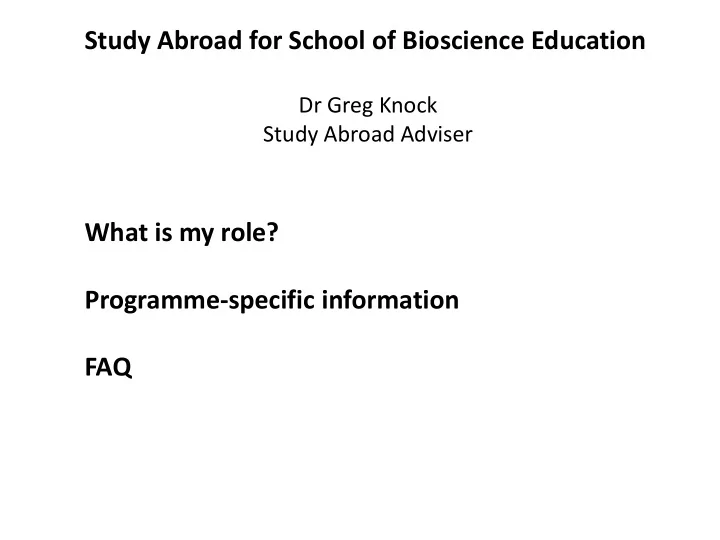

Study Abroad for School of Bioscience Education Dr Greg Knock Study Abroad Adviser What is my role? Programme-specific information FAQ
What is my role? General advice on academic matters Choice of destination to suit your programme Module selection (in liaison with your programme advisers) sign your learning agreement 1 st point of contact while you are abroad in conjunction with your programme adviser Contact Studyabroad Office for other matters Travel, visas Accommodation Financial Other non-academic guidance
Programme-specific information In your exchange year you must take and PASS modules that are approximately equivalent to compulsory year 2 modules on your programme and equivalent of 120 KCL credits in total Biomedical Science – free choice (as long as it is >80% Bioscience) Biochemistry Molecular Genetics Gene cloning & expression A/B Gene cloning & expression A/B Metabolism Human and molecular Genetics A/B protein structure & function Cell biology A + recommend 5BBB1203 Immune system in Health & Disease • discuss with programme advisor • • discuss with programme advisor includes some lab work • includes some lab work
Programme-specific information In your exchange year you must take modules that are approximately equivalent to compulsory year 2 modules on your programme and equivalent of 120 KCL credits in total Neuroscience Anatomy, Developmental and Human Neuroscience Biology Essentials of Embryology Structural Basis of Human Function Phys/Pharm of the CNS Essentials of Embryology Gene cloning & Expression A Cell Biology A/B Psychology 1 Neuroscience and the mind Philosophy of the mind or Mol & Cell NS • • discuss with programme advisor discuss with programme adviser • includes dissection
Programme-specific information In your exchange year you must take modules that are approximately equivalent to compulsory year 2 modules on your programme and equivalent of 120 KCL credits in total Pharmacology Physiology Drugs and Disease B Endocrinology and reproduction Phys Pharm of CNS Physiological control, Exercise & Environment Drug Discovery & Development Plus, one of the following: Research Skills Cell Biology A Report on a physiological topic Pharmacology & Mol Gen Neuroscience Drugs and Disease B Phys Pharm of CNS Gene Cloning A & B Human Molecular Genetics Drug Discovery & Development Research Skills • • discuss with programme adviser discuss with programme adviser
Programme-specific information In your exchange year you must take modules that are approximately equivalent to compulsory year 2 modules on your programme and equivalent of 120 KCL credits in total Nutrition/Nutrition & Dietetics Please consult with your programme advisers before applying
Programme Advisers Biochemistry – Dr Alison Snape Molecular Genetics – Dr Shirley Coomber Neuroscience – Dr Clemens Kiecker Anatomy, Developmental and Human Biology – Dr Anna Bataglia Pharmacology/Pharmacology & Mol Gen . – Dr Stuart Paterson Physiology – Dr Greg Knock
Partner Universities Karolinska Institute, Stockholm, Sweden University of Melbourne Australia Whole year National University of Singapore University of California -- 1 st Sem only University of North Carolina, Chapel Hill -- 1 st Sem only University of Skovde, Sweden 1 st Sem or whole year *** NEW Johns Hopkins, USA
Where can I go to suit my programme? Biomedical Science – free choice. Only Biomed can go to Karolinska or Skovde Biochemistry – Melbourne, Singapore, UC maybe and may depend on which campus Johns Hopkins (Sem A only) TBC Molecular Genetics - Melbourne, UC maybe and may depend on which campus Johns Hopkins TBC Neuroscience – Melbourne, Singapore possible, UC possible and may depend on which campus; Johns Hopkins TBC Anatomy, Developmental and Human Biology – Melbourne, Singapore maybe, UNC maybe Pharmacology/Pharmacology & Mol Gen . – discuss with programme adviser Physiology – discuss with programme adviser
University of California Maths requirement Must have evidence of passing exams that include calculus (A2 Maths or equivalent) You cannot apply to UC without this Six independent campuses/colleges Los Angeles San Diego Irvine Berkeley Santa Barbara Davis But you cannot choose which, they will assign you to one if accepted Also note that UC is academically demanding, especially Berkeley
Getting onto your chosen modules Karolinska & Skovde - mainly a set programme, but there may be some flexibility Melbourne and Singapore most flexible relatively easy to get on courses UC, UNC and possibly J-H - Sign-up is on a first-come-first served basis and priority may be given to home students You will need to be pro-active (persist, pushy, pesky, persuasive) with module co-ordinators
How many credits do I need to pass at each partner uni? Karolinska Institute: 60 ECTS credits University of Melbourne: 100 credits National University of Singapore: 32 credits University of California, Berkeley: 26-28 credits* University of California, other campuses: 32 credits* University of North Carolina: 12- 14 credits (semester A only) University of Skovde: 30 ECTS credits (semester A only) Johns Hopkins TBC
Frequently asked Questions How does it contribute to my degree grade? You must pass the equivalent of 120 KCL credits, but grades do not contribute to final degree classification Can I change programmes while abroad? Yes, but better to wait until after your return Can I apply for Medicine or Dentistry after studying abroad? Yes, but you will need to do well, even though grades do not count Can I also do an extra-mural year? Yes, and you can even do it abroad Is single semester exchange available? Yes, but only at UNC & Skovde and only in Sem A
Recommend
More recommend